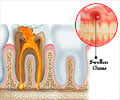Less than one percent of children living in urban areas in Toronto received dental care by the age of 12 months, a new study found

The study found never having been to a dentist was associated with younger age, lower family income, prolonged bottle use and higher daily intake of sweetened drinks such as juice. With each one-cup increase in the amount of sweetened drinks consumed daily, the odds of never having visited a dentist increased by 20 per cent. Of children who had visited a dentist, 24 per cent had at least one cavity.
Dr. Maguire said prolonged bottle use, especially at night, and sweetened drinks are suspected risk factors for cavities because the carbohydrates in the beverages promote the growth of the bacteria that causes cavities. Among children who had been to a dentist, older age, lower family income and East Asian maternal ancestry were also associated with having one or more cavities. Cavities can cause not just pain in children but also contribute to feeding problems, poor nutritional status and behavioural problems, Dr. Maguire said.
He said previous studies have found that children who receive preventive dental care in the first year of life have less dental disease, are less likely to require restorative or emergency treatment and have lower dental-related health care costs – particularly among high-risk populations. Barriers to dental care for families with young children may include financial cost, access to transportation, school absence policies and a belief that dental health may not be important to overall well-being, he said.
"It's one thing for primary health care providers to be recommending early preventive dental care but for many families this is unrealistic," said Dr. Maguire. "Publically funded universal early preventive dental care just makes sense"Dental care is not part of Canada's universal health care system and, as in the United States, it is primarily provided in private practice settings on a free-for-service basis.
Advertisement














